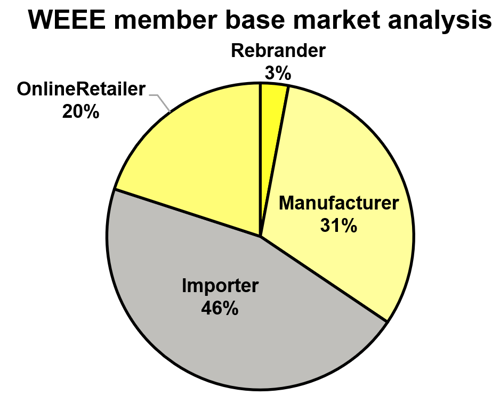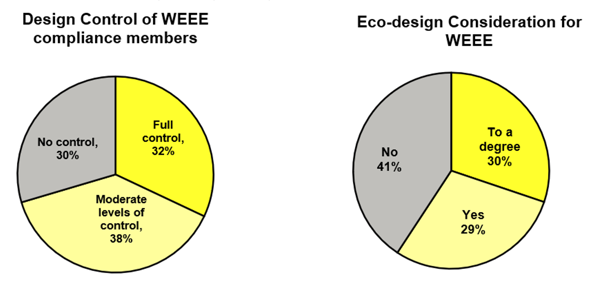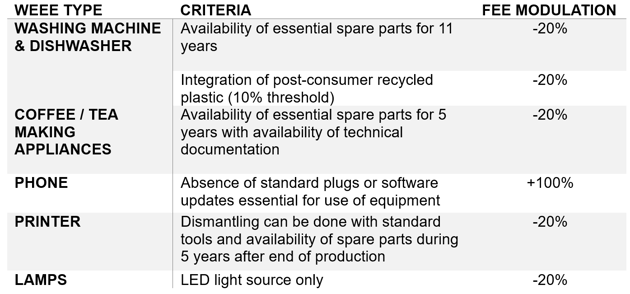Research: Are WEEE Producers ready for eco-modulation and eco-design?
Beyondly conducts research ahead of the Waste Electrical and Electronic Equipment (WEEE) reform to determine whether producers are ready for future implementation of eco-modulation and eco-design.
The heavily anticipated consultation on the reform of The Waste Electrical and Electronic Equipment Regulations 2013 (from here on referred to as the UK WEEE Regulations) is expected from Defra before the end of 2023. This is part of the wider Resource & Waste Strategy published by Defra in 2018, to review the existing UK WEEE Regulations, with the aim of reforming them to incorporate facilitating a transition towards a more circular economy through greater producer responsibility. Defra are expected to consult on reforming the following areas of the UK WEEE Regulations:
- Defining full and fair net cost
- Driving up levels of collections for reuse and recycling
- Obligating online marketplaces for the electrical and electronic equipment (EEE) sold via their platforms by overseas sellers
- Creating a separate category for vapes
- Incentivising better eco-design, reuse and drive towards a circular economy
- Driving up levels of collections of B2B WEEE
- Driving treatment standards including CRM recovery
- Alternative metrics to measure success of the system
If you are a business that is obligated under the UK WEEE Regulations, it's important to stay informed on developments regarding the reform, particularly concerning eco-modulation of compliance fees in the reformed system. In this article, we’ll explore how these proposed changes can impact your business that supplies EEE to the UK market and why you should start considering the impacts now. The UK WEEE Regulations ensure responsible disposal and recycling of WEEE, whilst mitigating their environmental impact. The term 'eco-modulation' is at the core of the proposed future changes, which would modulate or vary producer compliance fees based on the eco-design of their EEE placed on the UK market. Thus incentivising businesses to go beyond compliance and encourage increased focus on eco-design, sustainable manufacturing practises and effective recycling methods.
The eco-modulation system proposed by Defra would likely incorporate a 'bonus/malus' mechanism based on the eco-design of the EEE. If your business complies with specific sustainability criteria within this mechanism, you stand to benefit financially through bonuses while conversely, failing to meet these criteria can lead to financial penalties through maluses. These criteria are yet to be defined by Defra, however these will likely be proposed in the consultation;
Potential eco-design criteria outlined in research completed by DSS+ for Defra’s consideration, based on existing European systems are:
- Disassembly
- Repair (spare parts)
- Upgradability
- Longevity (extended warranty)
- Post-consumer recycled content
- Hazardous substances (SVHC list)
See the full report outlining these criteria here.
Our Findings
Beyondly recently surveyed their WEEE compliance members, which identified that manufacturers of EEE only accounted for 1/3 of their member base. The majority of members fall into the product distributor category through activities like import, online retail and rebranding. Distribution activities generally sit with reduced levels of product control.

Only 32% of WEEE members said they had full design control of their products, corresponding with manufacture market roles, as demonstrated in the above diagram. With 30% of our member base having no control and 38% with moderate levels of design control, we advise our members and other producers to thoroughly consider the proposed eco-design element expected in the consultation of the UK WEEE Regulations reform and how this may impact their business. It is likely producers with no control or moderate levels of control may struggle to develop design in line with the eco-design criteria, and as a result incur a greater financial burden. Collaboration with suppliers and engagement with the wider value chain will be key to initiate action in line with this eco-design proposal.

Similarly, a 41% majority of Beyondly’s WEEE members reported no focus on eco-design for their products and less than a 1/3 answering "YES" to eco-design consideration highlighting a lack of preparedness for the elements of the WEEE Regulations that we are expecting to be reformed. As discussed, producers that do not incorporate the proposed eco-design criteria under the reformed UK WEEE Regulations will likely be penalised with higher fees. Changes to product design typically have incredibly long lead times so we urge producers to begin considering eco-design criteria, to get prepared for the reform.
The UK is behind in terms of eco-design, with France among other nations in the EU having had Regulations in place to modulate fees for nearly a decade. Eco-modulation for EEE product end-of-life treatment fees has been a part of the French Regulations since 2010 which began with six product types and has evolved to include may others, with some example products and eco-design criteria below:

Challenges
Regulatory uncertainty
EEE products are complex, costly to treat when waste, and have limited room for cost reduction. Re-design of ‘greener’ EEE products is expected to have limited cost-saving potential, often below £3 per item in terms of eco-modulation, if aligned with French Regulations. Through regulatory changes, balancing environmental benefits like reuse and recyclability with carbon impact in fees is challenging and there is no clear solution yet. There is potential that redesigning EEE could also contribute to rapid obsolescence of such products. Ongoing consultation and government involvement will shape the eco-design criteria and eco-modulation incorporated into the UK WEEE Regulations in the near future, hence it is imperative for stakeholders to engage.
Government delay
Discussions on incorporating eco-modulation into the UK WEEE Regulations began in 2018 with the publication of Defra’s Resource and Waste Strategy coinciding with the beginning of the reform process of other UK producer responsibility Regulations, but currently 5 years later, the consultation process on reforming the UK WEEE Regulations has not been published by the UK Government. The latest update from Defra, is that the consultation will be published before the end of 2023 which Beyondly will be engaging with our stakeholders on and responding to. Due to our survey findings displayed in this article and our ongoing work with various businesses affected by the UK WEEE Regulations, we are actively seeking feedback from current WEEE compliance members and others within the industry for their thoughts on the proposed reform elements and how it will impact their business.
If you would like to feedback your thoughts on the proposed changes to the UK WEEE Regulations outlined in this article, or hear more about the future of WEEE eco-modulation and the wider system reform, please do get in touch with solutions@beyond.ly


